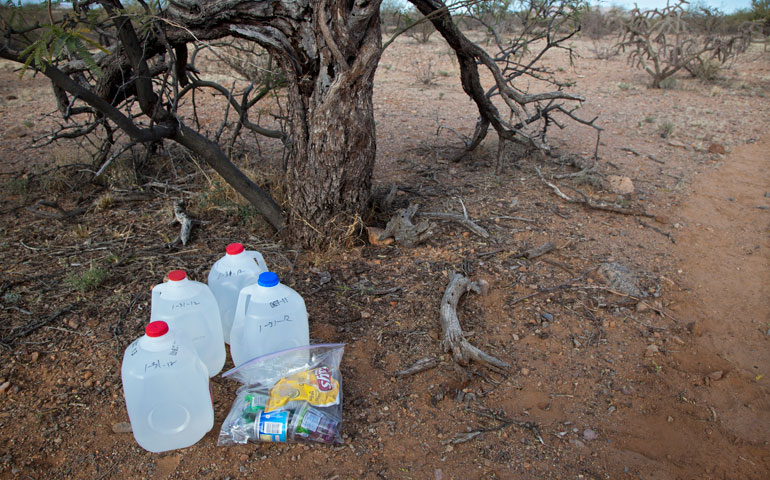
Water and food for migrants from Mexico that were left along a desert trail by volunteers with No More Deaths are seen in late January 2012 in Arivaca Junction, Ariz. (CNS/Jim West)
 SHOWDOWN IN THE SONORAN DESERT: RELIGION, LAW, AND THE IMMIGRATION CONTROVERSY
SHOWDOWN IN THE SONORAN DESERT: RELIGION, LAW, AND THE IMMIGRATION CONTROVERSY
By Ananda Rose
Published by Oxford University Press, $29.95
The Sonoran Desert is vast: 100,000 square miles of danger and extreme temperatures straddling the borders of California, Arizona and the Mexican state of Sonora. It is also a main trafficking route into the United States. Every day and at every hour, people enter this crucible hoping to be among the lucky who make it through and into the land of opportunity.
Those who set out toward el norte, the north, come in large groups hoping for better lives; they say goodbye to families and leave home, not knowing if they will return. The desert is a battleground upon which people fight for their lives. But the migrants are not the only ones who head into the desert every day. Border patrol officers also leave their homes with the fear of not knowing if they will return to their families.
The border has become a hostile zone dominated by terror, anguish and insecurity.
The first part of Ananda Rose’s Showdown in the Sonoran Desert tells the story of the border from the perspective of the religious community and those who believe in the Judeo-Christian tradition of hospitality. The chapters are filled with arguments, testimonies and details about the happenings along the border: the injustice -- sometimes brutal injustices -- in the border trials, the sanctuary movement, and humanitarian aid along both sides of the border.
Rose, a poet, journalist, theologian and fiction writer, introduces the Catholic and Protestant coalitions along the border that recognize the “God-given” right for migration when the basic necessities for a sustainable life are not available. It is from this acknowledgment that all the movements nourish their mission. Some maintain a passive humanitarian assistance; others do not hesitate to take up a challenge in the name of their cause. These folk embody the actions of the Good Samaritan and believe in the right to a dignified life.
The book’s perspective then shifts to the law and those who believe in protecting the nation. Their issues are security, sovereignty and states’ rights. Their focus includes the wall, racial profiling, the invasion of illegal aliens, crime, Border Patrol, and the Minutemen and similar border coalitions. Most of the groups who oppose the illegal crossing of migrants through the desert see a clear divide between church and state.
Their motto, “For God and country,” is flipped: Country, the law, must come first, hence their justification for distinguishing between “illegal” and “legal” migrants. They bolster their cause by pointing to the increase in crime. Many ranchers and people who live along the border feel unsafe, understandably so, as many have been victims of smugglers entering and stealing from their property — or worse.
Then there are the Border Patrol officers. Their duty is to gain and maintain control, yet they are frequently outnumbered, which results in an “every man for himself” scenario. In the second half of Showdown in the Sonoran Desert, Rose outlines the push-and-pull factors that contribute to this massive influx of migration into the United States and the resulting grave border conflict.
As a first-generation American with Mexican heritage, I know the factors that force people to migrate to the United States, but as an American who has lived near the border, I am also aware of the danger that fills the area between two neighboring countries. Immigration and the border play a significant role in the United States precisely because migrants built our country. But the question today is: If the United States, still a young nation of migrants in the process of fully establishing its identity, is highly exclusive, then how can it achieve its ideals of freedom, opportunity and equal rights?
Showdown in the Sonoran Desert clearly presents both sides of the dilemma at the border. Like the author, I tend to believe that the problem is the solution: the brutal drama is the result of a broken system, a system that has yet to be reconfigured. Border walls and unjust immigration policies only increase the border’s danger and fatalities.
With this in mind the author leaves the reader with this challenge: “And there is you, reading this, asking yourself, what should we do?” The author believes that solutions that end migrant deaths and suffering on the border also will lead to a healthier global economy.
I couldn’t agree more.
[Genesis Ibarra is serving with the Jesuit Volunteer Corps in Washington, D.C.]



